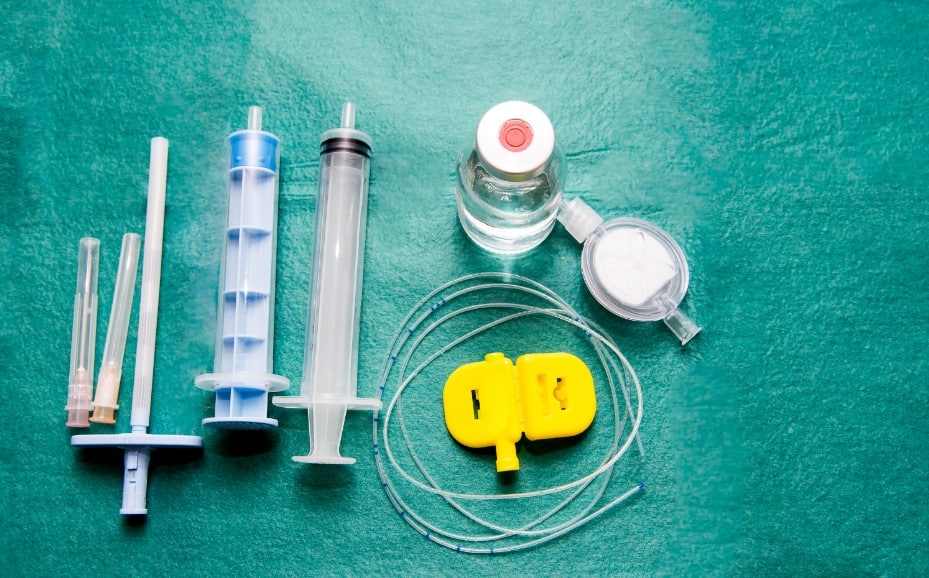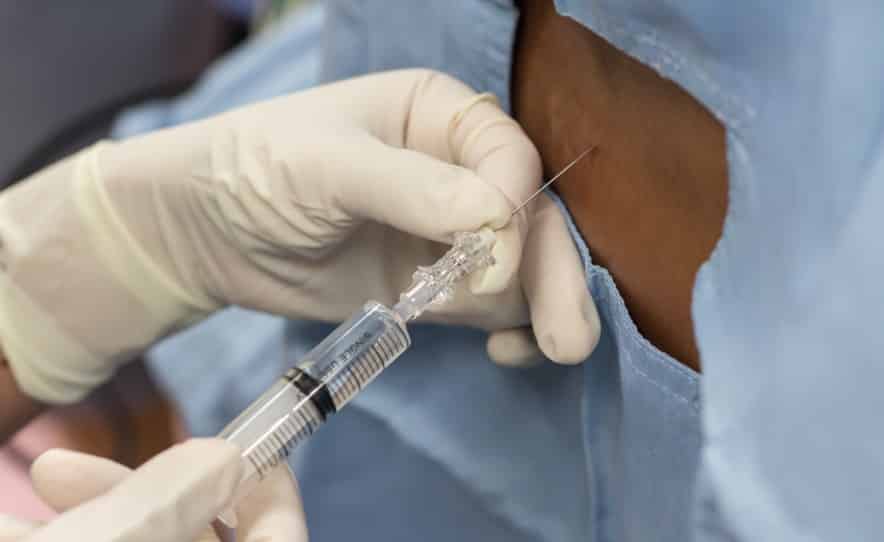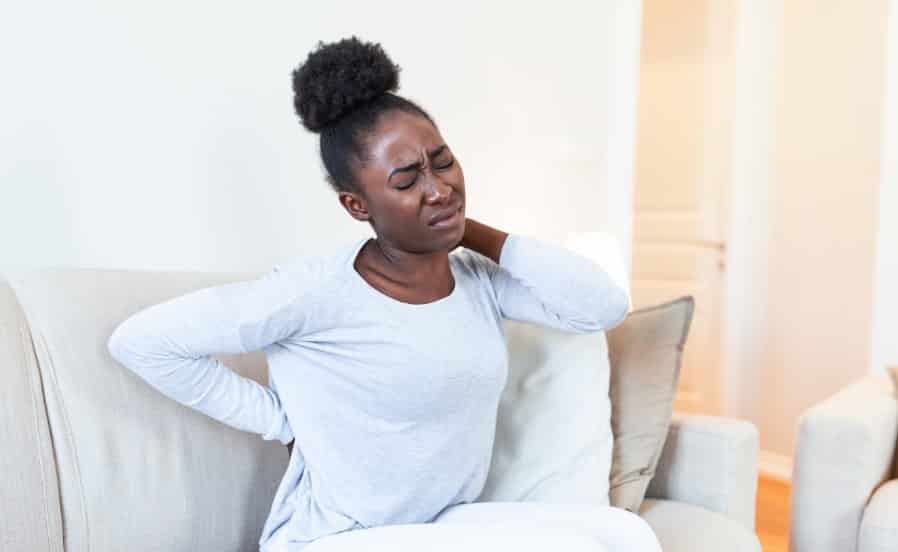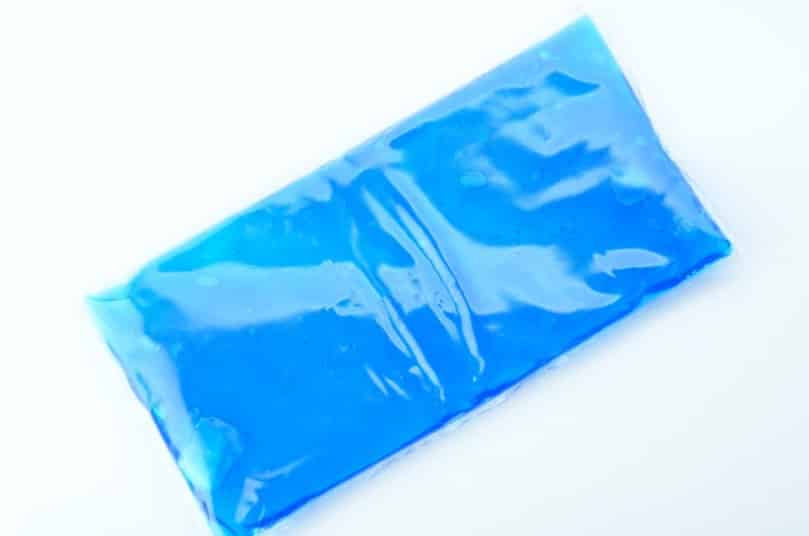Pregnancy often comes with a lot of pain and aches, including back pain. This is usually a result of postural changes, loosened joints, and overstretched muscles. However, some women may not even have any serious back pain until after delivery. Sometimes, preemptive steps like epidurals may not even shield you from pain after childbirth.
Do not fret!
There’s a way to manage the pain. In this article, we’d talk about epidurals; what it is, if it really causes back pain, and how to treat it.
Read on to find out!
Table of contents:
What’s An Epidural?
In plain terms, the word ‘epidural’ just means ‘near the spinal cord.’
It actually refers to an injection that is given close to the spinal cord with the ultimate aim of preventing pain. The procedure, also known as epidural anesthesia, involves introducing steroids or pain relief medication into the epidural space.
In the epidural space at the lower back, these steroids or pain relief medications can block pain in the lower half of your body while allowing you to feel the pressure you need to push your baby out.

Many women around the world choose to have an epidural during labor because it helps reduce the pain of childbirth.
Why Is It Used?
As we mentioned earlier, epidurals are used as a common pain relief method during pregnancy. This is because epidurals create a sense of numbness from your belly button to the upper parts of your legs.

This procedure allows you to stay awake and active all through the delivery process. During childbirth, epidurals are usually administered by:
- Your obstetrician
- An anesthesiologist
- A nurse
Here’s the exciting part: With epidurals, you can watch your little one come into this world with minimal pain.
Do Epidurals Cause Back Pain?
Although many people think that having an epidural will cause back pain after delivery, this may not be true.
According to the American Society of Anesthesiologists, there is no reliable evidence that an epidural will cause permanent back pain after delivery. In fact, even women who do not receive epidurals may experience back pain during pregnancy, labor, and delivery.

In most cases, the back pain that comes after an epidural results from your pelvic bones and ligaments returning to their pre-pregnancy position.
Although epidurals are unlikely to cause any long-term back pain, this does not mean it doesn’t have temporary side effects.
Sadly, about 3 in 10 women complain about certain side effects after taking an epidural. These side effects often include:
- Injection site pain
- Weak core muscles
- Lower back pain
- Hip Instability
Thankfully, the good news is: most of these side effects, including back pain, go away after a few days.
Symptoms of Back Pain after Epidurals
As we mentioned above, one of the common side effects of an epidural is soreness at the injection site. Most times, this leads to a dull ache or slight pain in the lower back.
Want to know the best part?
The discomfort usually stops after a few days.
How to Treat Back Pain after Epidurals
Back pain after epidurals can make it really difficult for most moms to care for their newborns. In addition to this, breastfeeding moms are even cautious of pain relief medication as it may be passed along to their newborns via breast milk.
However, you do not have to suffer.
No matter the cause of your postpartum back pain, there are a number of ways to find relief and give your little one all the care he/she needs to thrive.
Here’s the deal:
1. Massages
No doubt, this is an awesome way to relieve back pain at any time.
If you have to, getting a massage from your partner or a professional is a sure way to soothe the sore muscles in your back and get complete relief from back pain.

2. Rest
Interestingly, this is easier said than done. Especially when caring for a newborn!
However, it is really important to relax and rest your back in this period. In fact, you may want to buy a supportive (and fluffy) pillow to place beneath your knees when lying down.
In addition to relieving any back pain that may occur after an epidural, rest would keep you in tiptop shape to care for your baby.
3. Hot & Cold Compress Therapy
This is a simple form of therapy that involves switching between hot and cold compresses to reduce pain and discomfort after an epidural.
Immediately you notice back pain after delivery, place a bag of ice on your lower back at regular intervals. However it is important to wrap this ice pack in a towel to eliminate the risk of frostbite due to exposure to cold.

Although you can apply the cold compress as often as you need to, remember to keep each session below 15 minutes.
After a few days or a week, you can make the switch to heat therapy. To ease the pain in your back, you can:
- Use a heating pad
- Apply a warm compress
- Take a warm bath
However, if you just had a C-section, you need to avoid warm baths until your incision has fully healed.
4. Exercise
Weird, right?
Not really. Extensive studies have shown that exercise can actually reduce back pain after epidurals. However, it is important to limit the routines to low-intensity exercises only, especially as your body recovers from the strain of labor and delivery.
In addition to the popular core exercises like the side-lying crunch, research shows that yoga can also relieve lower back pain during pregnancy and after delivery.
5. Prescribed Medication
If you’ve tried all the steps listed above and the pain isn’t going, you may need to speak with your healthcare provider. Based on his/her discretion, you may get pain relief medications that are compatible with breastfeeding.
When Does the Back Pain Stop?
As we mentioned earlier, back pain resulting from epidurals usually resolves within a few days. In addition, most researchers agree that general back pain after childbirth often subsides within 6 months after delivery.
However, if the pain gets worse in the weeks after childbirth, please consult your doctor.
A Final Note from Edie & Amy
Although epidurals may cause some amount of pain in your lower back (the injection site), it is unlikely to be the main cause of postpartum back pain.
The fact is: your body is simply adjusting to its former alignment and everything would go away after a while.
As you wait, remember to rest and exercise often.
Stay strong, Mama!
References
- Macarthur, A. (1995). Epidural anaesthesia and low back pain after delivery: a prospective cohort study. The BMJ(311). doi: 1995;311:1336
- Schroeder, T. H., Krueger, W. A., Neeser, E., Hahn, U., & Unerti, K. (2004). Spinal epidural abscess—a rare complication after epidural analgesia for labour and delivery. British Journal of Anaesthesia, 92(6), 896–898.

